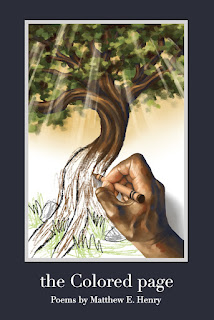Matthew E. Henry‘s “self-evident”
Yesterday I went to a New England Poetry Club reading at the Fruitlands Museum in Harvard.
One of the poets sharing work was Matthew E. Henry, who is also a schoolteacher. He grew up in Boston and went to school in Wellesley, and in this poem he looked back on those years.
“self-evident” was a published first in the Tahoma Literary Review. It’s included in Henry’s collection The Colored Page, which on its webpage has the sell line: “How it started: Only Black kid in the room. Where we are: Only Black teacher in the building.”
One of the poets sharing work was Matthew E. Henry, who is also a schoolteacher. He grew up in Boston and went to school in Wellesley, and in this poem he looked back on those years.
self-evidentThe specific details, from the reminder of neighborhood enmities to the mention of Asa Pollard’s head, really evoke a post-Bicentennial Boston childhood. But they also remind us that nearby childhoods could be vastly different, then and now.
as a kid from Boston, the Revolutionary War
was my favorite subject in fourth grade.
a Tea Party I could respect. class trips vainly
searching for musket balls in Lexington treetops.
reading of decapitation by cannonball on Breed’s Hill.
even the sights in Southie— unsafe for me to visit—
were a source of tribal pride. like rooting for the Patriots.
we were told to don our colonial imagination caps
and tell our story of emancipation from the British.
where would we be? the Old South Meeting House?
the Old North Church? what would we see as we rose
to American greatness? our teacher should hear freedom
ringing in the streets through our words. I dropped my head
to begin— oversized pencil in hand— until I remembered.
seeing my inaction, she crouched and began to re-explain.
I patiently waited for her to finish, eyes on her lips,
then asked if she wanted me to pretend to be white,
or to picture myself for sale on the steps of Faneuil Hall,
or stacked in one-half of the Harbor ships heading to
and from the West Indies, explaining my parents’ patois.
after the vocal static— the hems and haws of white noise—
she suggested Crispus Attucks: the hometown boy, the Black
hero of the Boston Massacre. my siblings had taught me
the “one-drop rule,” and when to nod my head politely,
so I pretended he was not half Wampanoag, that Framingham
was not his master’s home, and imagined myself being
the first unarmed Black man shot on these urban streets.
“self-evident” was a published first in the Tahoma Literary Review. It’s included in Henry’s collection The Colored Page, which on its webpage has the sell line: “How it started: Only Black kid in the room. Where we are: Only Black teacher in the building.”


No comments:
Post a Comment